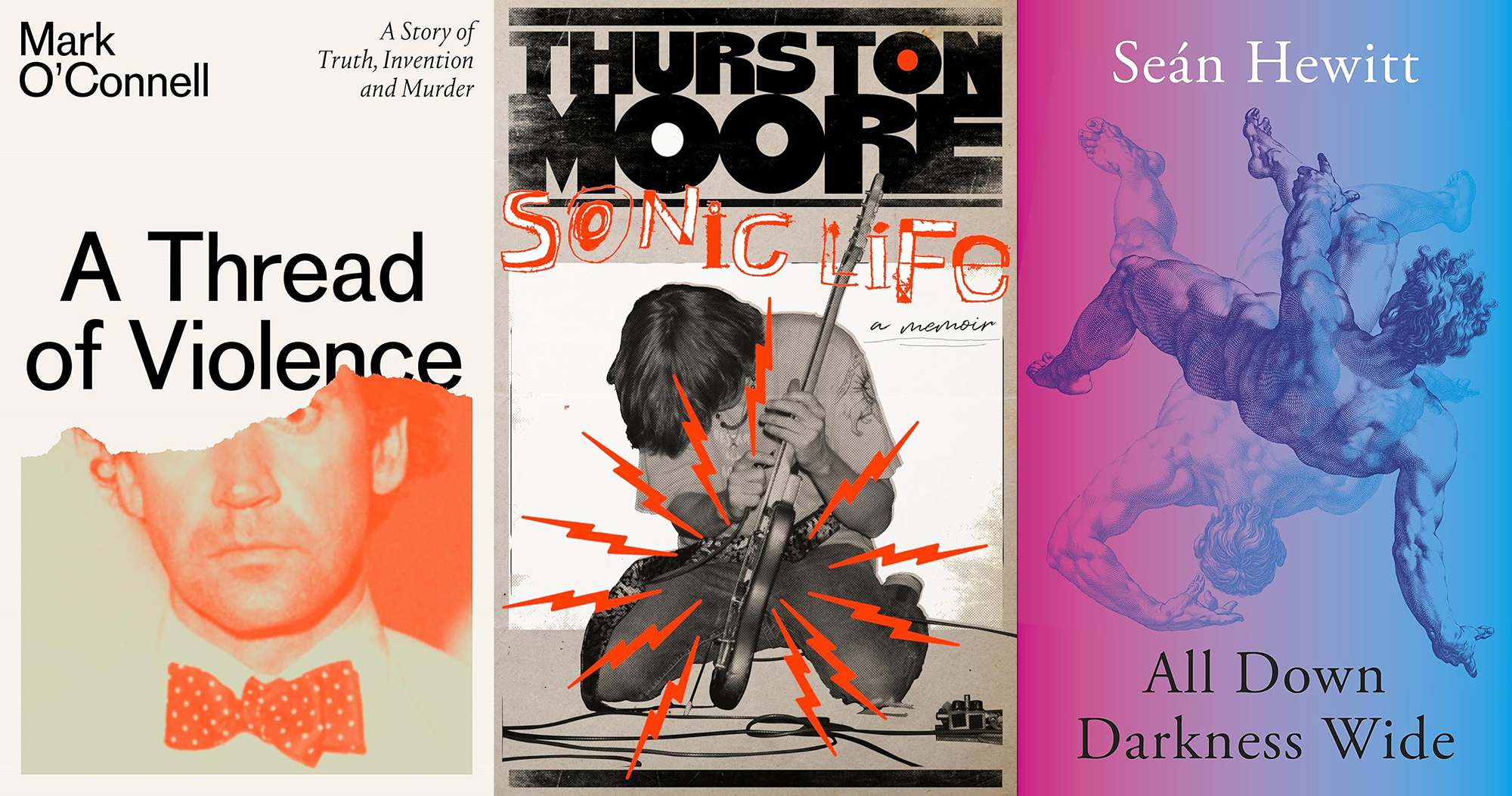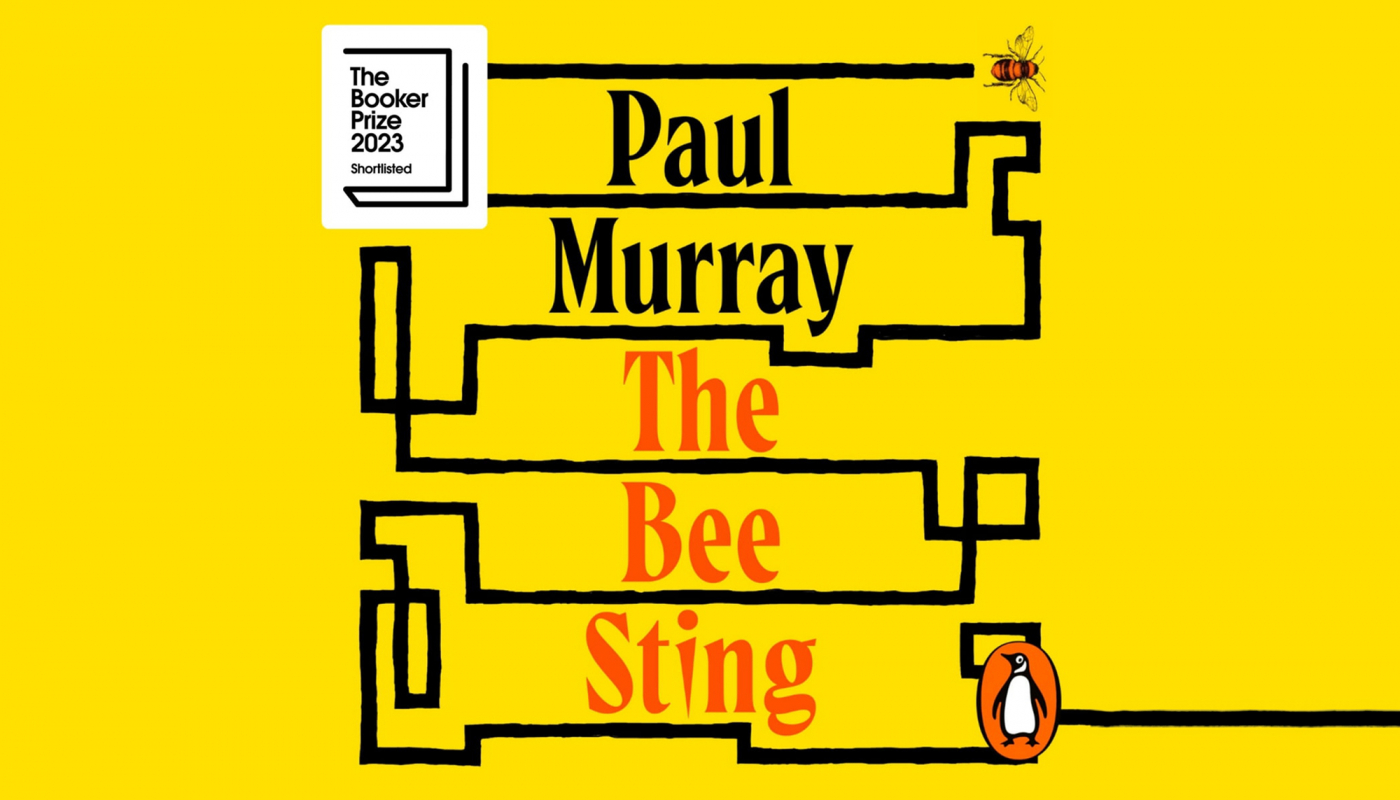Let’s begin with full disclosure. The high point of my literary year was followed within milliseconds by the lowest, when the words “the Winner of the Booker Prize 2023” were not followed by the name of my friend (and fellow UEA 2001 alumnus), Paul Murray. Personal bias aside, it’s clear that 2023 was the year of The Bee Sting (Hamish Hamilton/FSG), Murray’s best novel to date, an epic tragedy that combines family saga with a heartfelt broadside against the systems that make our world and can break its people. The Bee Sting tells the story of our times through one family as remarkable and unremarkable as any other; the prose has a lightness of touch that makes a long novel ceaselessly readable as Murray unearths the secrets by which they’ll bring about their own destruction. Paul Lynch’s Prophet Song (Oneworld/Grove Atlantic) may have won the big prize, but in my (not at all objective) opinion The Bee Sting sets the higher bar for next year’s contenders to clear.
In my (not at all objective) opinion The Bee Sting sets the higher bar for next year’s contenders to clear
There was another outstanding work of fiction for me this year, Camila Grudova’s second collection of short stories, The Coiled Serpent (Atlantic). At first these pieces, some very short indeed, seem slight, and to be playing the same trick: describing a realistic, often mundane setting then bringing in some surreal imagery or action. Yet, as you gulp these down – and I think they’re worth reading in clutches, not one at a time – their effect accumulates and Grudova’s project becomes clear. These are tales of repression and control, about bullshit jobs, about places that have gone out of fashion or been allowed to go to ruin. It is, in short, a book of fairy tales about capitalism, and a lot more fun than that description may sound. Grudova’s take on tech bros’ obsession with getting hench is terrific, grotesque and hilarious; at the other end of the socioeconomic-exploitation scale, she captures the drudgery of lives spent in drab seaside towns and superannuated municipal saunas – then spikes them with gleefully weird and often downright disgusting imagery. All sorts of excrescences, excretions and ejaculations ooze and blurt into these stories, reminding us that the body remains fundamentally uncontrollable by the forces that seek to shape and limit what we do with our lives. This is a standout collection from one of our greatest short story writers. She deserves to be huge.
The other big, literally, novel of the year was Eleanor Catton’s Birnam Wood (Granta/FSG) – inexplicably, in my view, overlooked for the Booker longlist. It starts slow, in long well-turned sentences relating the lives and loves of young would-be eco-subversives in Aotearoa/New Zealand. Just when you’re starting to worry that this kind of detailed, mostly dialogue-free character sketching (a lot of telling not showing) is never going to catch fire – as, for me, her last novel The Luminaries did not – plot starts to creep in. The first third of this book is mapping out a territory, physical and psychological, over which conflicts will be fought with increasing fervour; after you’ve hurtled through the last hundred-odd pages and found time to catch your breath, you’ll appreciate the early slow burn of this very readable, very 2023 novel.

O’Connell, Moore, and Hewitt
Also inexplicably missing from prize lists was Claire Kilroy’s brilliant Soldier Sailor (Faber/Scribner). Sailor is the narrator’s two-year-old son, Soldier her husband, and she herself is starting to feel she’s going out of her mind as she suffers a kind of war of attrition from the two men in her life, creatures of pure need. If this sounds a bit heavy, don’t be dissuaded: this is the funniest novel of the year, with long bravura set pieces in playgrounds and a branch of IKEA that had me laughing out loud (almost unheard of once never mind multiple times), all related in prose that exactly captures the experience of trying to offset sleep deprivation by sinking three double espressos.
A different kind of absent woman stands at the heart of Anna Metcalfe’s first novel Chrysalis (Granta/Random House), in which three narrators recount the strangeness of their time with, respectively, their lover, daughter, and friend. She takes up bodybuilding, she becomes a viral sensation – but who is she? This is a novel for the social media generation, in the best possible way. Dorothy Tse’s Owlish (Fitzcarraldo Editions/Graywolf Press, trans. Natasha Bruce) is an unsettling fantasy, set in an imagined Hong Kong, in which a dissident professor falls in love with a mechanical doll: it only gets weirder from there. The narrator of Claudia Piñeiro’s A Little Luck (from the ever reliable Charco Press, trans. Frances Riddle) returns, two decades on, to the scene of an incident so terrible she can’t even bring herself to tell the reader what happened; this is a story of mistakes made and redemption offered.
I loved Lalla Romano’s A Silence Shared (Pushkin Press, trans. Brian Robert Moore), about a love triangle in occupied Italy, which has the glassy suspended stillness of a long summer’s day. Daunt Books added another winner to its excellent list of rediscovered classics, Pamela Frankau’s A Wreath for the Enemy: originally published in 1954, the novel shares some traits with I Capture the Castle and even The Catcher in the Rye, but it has a tone very much its own, gritty and eccentric. And Eliot Duncan’s Ponyboy (Footnote Press/W.W. Norton) won me over as I read; what starts out a familiar story of druggy excess and boundary-pushing sex becomes, once the eponymous narrator departs hedonistic Paris for rural Iowa and enters rehab, a very moving piece of work. As Ponyboy starts to feel at ease with himself, so too does Ponyboy’s at first overwrought prose calm down, becoming stately and allowing the reader to draw close at last.

Kilroy, Catton, and Piñeiro
Among the notable paperbacks of 2023 was a welcome new dose of Vigdis Hjorth’s brilliant black humour in Is Mother Dead (Verso), translated from the Norwegian by Charlotte Barslund), in which a woman stalks members of her estranged family; the conclusion is as surprising as it is fitting. In José Eduardo Agualusa’s satire The Living and the Rest (MacLehose Press, trans. Daniel Hahn), guests at a writers’ festival find themselves stranded from the outside world by a mysterious disaster – maybe a storm, maybe a nuclear catastrophe – and haunted by what seem to be figures from their own fiction. And finally, Hernan Diaz’s Trust (Picador/Penguin US) is an intelligent, immensely readable story about the deception on which one family’s rise to unimaginable wealth, from the roaring twenties to the present day, is predicated.
It will send you, as all good music books should, back to the records that make up its soundtrack
In non-fiction (excluding present company), I enjoyed Thurston Moore’s Sonic Life (Faber/Knopf Doubleday), a pleasantly nerdy music memoir. There’s relatively little about the making of Sonic Youth’s records, and nothing at all about what Moore has been up to since the dissolution of the band a decade ago; instead there’s plenty on who played what shows at which venues when, and who was in the audience. It’s a fun was-there-then chronicle of a New York that’s since been drained of subculture by Starbucksisation, and it will send you, as all good music books should, back to the records that make up its soundtrack.
Prurience will probably draw many to Polly Barton’s Porn: An Oral History (Fitzcarraldo Editions – thank goodness for their plain white covers) but it is, of course, a great deal more thoughtful than the title suggests. The histories in question are those of 19 people who Barton interviews about their use and experience of porn – they cover the spectrum of ages and sexualities, and of consumption, from those who’ve seldom or never used pornography to those who might be considered addicts. Consistent strands emerge, of which the most interesting to me was the notion of “ethical” porn – paid for, and overtly consensual – whose very nature disrupts what we have come to think of the internet as being for. A brighter future, of sorts, is suggested here.

Grudova, Bridle, and Metcalfe
Mark O’Connell’s previous books have been surveys of various ways by which humanity might be destroyed or refigured by forces of its own making. In A Thread of Violence (Granta/Knopf Doubleday) he changes tack, investigating the acts that led to the downfall of one man, the socialite and double murderer Malcolm Macarthur. Alternately charmed and unnerved by his subject – who still lives in Dublin, where his crimes took place 40 years ago, and seems more than happy to welcome this biographer – O’Connell worries away at what starts to seem like an alarming existential absence at Macarthur’s core.
In paperback: Ways of Being by James Bridle (Penguin/Picador US) is far more than the cover’s hint that it’s primarily about AI. Rather, it’s a fascinating exploration of the various kinds of non-human intelligence that surround us, from plants that “learn” to animals who “paint” (the fact that we habitually put such verbs in quote marks when discussing non-human entities is part of the problem), and how understanding them could help us tackle the pitfalls of machine intelligence that may lie ahead. Thomas Halliday’s Otherlands (Penguin/Random House) takes us backwards from the present epoch through hundreds of millions of years of evolution, unravelling our origins all the way back into the seas where life began. It’s most compelling when Halliday zooms in, like a good nature documentarian, using precise examples to illustrate the larger points of his thesis. And in All Down Darkness Wide (Vintage/Penguin US), the poet Seán Hewitt has written a memoir of a lost friendship and a doomed love, shaping his responses to tragedy through the poetry he loves and the lives of those who turned heartbreak into literature; he has performed the same alchemy here to produce this moving and beautiful book.
And finally, it’s hard to say what precisely is the mix of the precise and surreal, the universal and the skeweringly personal that makes poetry land for a reader, but this year Jamie McKendrick’s Anomaly (Faber) did it for me. His poems around ageing, in particular, I relished.
There’s little we can do to halt the passing of time, but my favourite books this year have looked at what we can and should change about ourselves and our environment. Redemption, recovery and forgiveness came up as repeated themes; so too did the disastrous outcomes when we fail to recognise or admit our mistakes, seek to bury them, or kick them forward for future generations to deal with. The world may be a very different place by the end of 2024; the lessons our best books teach us about actions and consequences should be borne in mind as we enter the new year. C
Neil D.A. Stewart is the author of the novel Test Kitchen, forthcoming from Corsair in July 2024
Civilian recommends independent UK retailers BookBar, Book Hive, Burley Fisher Books, Ink84 Books, the London Review Bookshop and Pages of Hackney (London), Mr B’s Emporium (Bath) and Golden Hare (Edinburgh)







